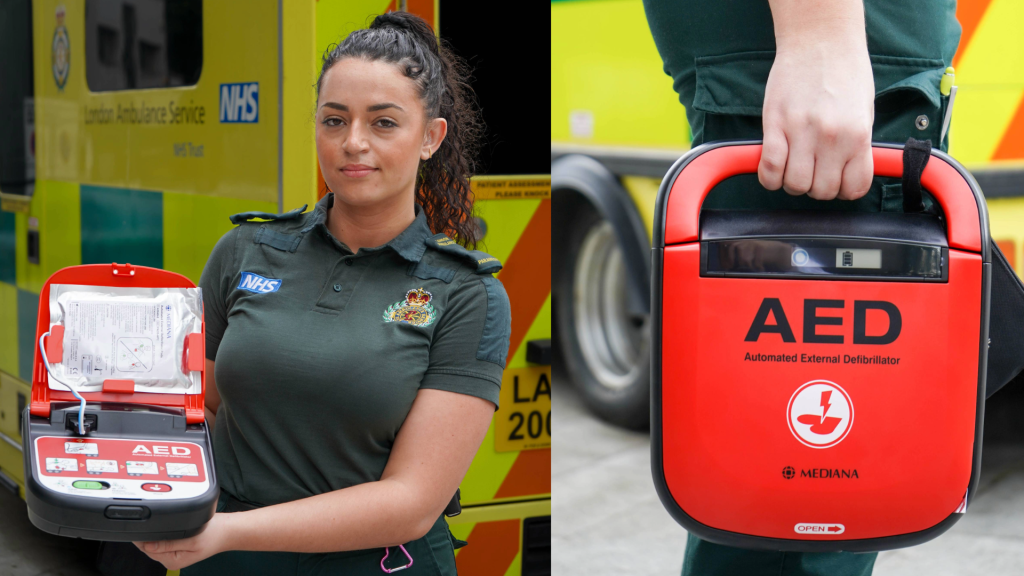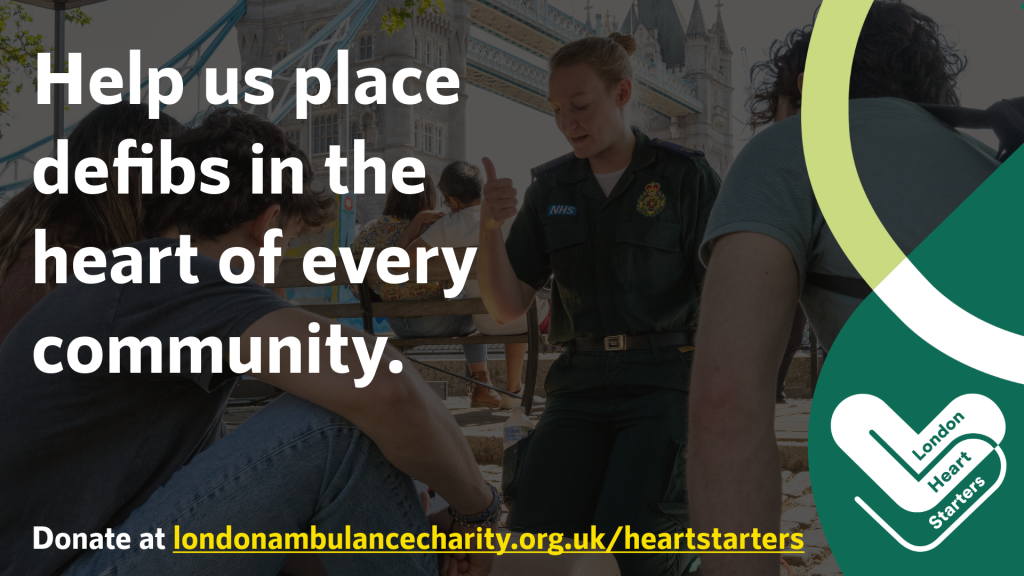The ‘shocking’ truth: the neighbourhoods in need of life-saving defibrillators
New data from London Ambulance Service reveals the 150 neighbourhoods across the capital in greatest need of life-saving defibrillators.
When someone suffers a cardiac arrest – which is when the heart stops beating – the use of a defibrillator gives them the best chance of surviving. But new analysis from London Ambulance shows 21 neighbourhoods where there is no access to a defibrillator, and 129 neighbourhoods where there is limited access for the population nearby.

The stark data also shows that households in deprived areas are more likely to be in one of these 150 areas, with one central London borough having six times more defibrillators than those in some poorer neighbourhoods.
Chief Executive of London Ambulance Service Daniel Elkeles said: “When someone is in cardiac arrest, every second counts in the fight for survival. Our ambulance crews get to these sickest patients quickly, but by starting CPR and using a defibrillator, you can help save someone’s life.
“Our new data is a sad reminder that some areas in London are ‘defib deserts’ – this means where you live or work could determine your chance of surviving a cardiac arrest. London is an amazing city, and we want the capital to become a global leader on responding to cardiac arrest by increasing the number of people who are ready and willing to help. We’re sharing this analysis with Londoners and asking you to get involved in fundraising for urgently needed defibrillators – we want to start a social movement, and improve survival rates for all of us.”
The publication of the new data marks the start of a new fundraising campaign to fund and maintain additional defibrillators in the 150 communities where they are needed most. Known as London Heart Starters, the campaign aims to build on the successes of ongoing London Ambulance initiatives to improve cardiac arrest survival rates in London. This includes the London Lifesavers programme which provides free CPR and defibrillator training and has committed to training a generation of year eight school children in these life-saving skills.
Consultant Paramedic Mark Faulkner said: “At the moment only eight per cent of Londoners survive a cardiac arrest if it happens outside of hospital. Sadly, each minute of delay in resuscitation reduces chances of survival by around 22 per cent, as brain tissue starts to die within minutes after the heart stops. But survival rates are over 50 per cent if a defibrillator is used before paramedics arrive. Everyone can learn CPR and what to do in an emergency.”
“While there are more than 9,400 publicly accessible defibrillators in London, our analysis shows that there are fewest in areas with the highest levels of deprivation and poorest health outcomes. We want Londoners, regardless of where they live, to have a fighting chance to survive a cardiac arrest. This is why the London Ambulance Charity’s London Heart Starters campaign is so vital.

“If we could double London’s cardiac arrest survival rate – which the best parts of the world suggest is possible with bystander help – we could save the lives of hundreds more people every year.”
Jess Burgess, Head of Charity Development at London Ambulance Charity, said: “You never know when you might have to step in and help someone you love at home or in your community.
“A public-access defibrillator and cabinet costs £1,600, but every penny raised in this new campaign will go to funding this life-saving equipment in priority areas. A gift to the London Heart Starters campaign is a gift of life to Londoners of all ages, races, ethnicities, and genders. It could also be the gift to the people you love and an opportunity to make a lasting impact on the health of the capital.
“I would urge all Londoners to try and get involved, whether that’s taking part in our first ever fundraising walk, the London Life Hike on Sunday 8 September – enjoying a family-friendly 5k loop or a more challenging 20k walk past the iconic landmarks of the city. You can also simply donate to our Charity to fund training and defibrillators in places they are most needed, or by signing up to learn these life-saving skills for themselves.
“The campaign will work with local communities to identify locations for the defibrillators, install the devices and provide training so people can confidently use them.”
Dr Charmaine Griffiths, Chief Executive of the British Heart Foundation, said:
“We’re delighted to support this campaign to place lifesaving defibrillators in the areas of London in greatest need. Performing early CPR and having access to a defibrillator gives someone the best chance of survival – and can be the difference between life and death. Every community deserves to be well prepared for the ultimate medical emergency by having easy access to defibrillators – it’s vital that we address unequal access to help save lives.”
Please visit our charity website to register for the London Life Hike, or email the charity team at [email protected] for more information.
A list of the 150 priority areas:
Barking and Dagenham
There are six priority neighbourhoods in the borough of Barking and Dagenham. These are Barking East, Becontree West, Old Dagenham Park and Village, Thames View, Becontree Heath and Becontree East.
Barnet
There are eight priority neighbourhoods in the borough of Barnet. These are Golders Green North, Oak Hill, Osidge, West Finchley, North Hendon and Sunny Hill, Childs Hill, Grahame Park and Finchley Central.
Bexley
There are seven priority neighbourhoods in the borough of Bexley. These are Lesney Abbey, Lesney Farm and Colyners East, Wickham Street and East Wickham, Bursted Wood, Barnehurst North, Falconwood and Longlands & Halfway.
Brent
There are eight priority neighbourhoods in the borough of Brent. These are Sudbury West, Kensal Green, Kingsbury South, Barnhill The Avenue, Welsh Harp, Dudden Hill, Willesden Green and Church End.
Bromley
There is one priority neighbourhoods in the borough of Bromley. This is Orpington South.
Camden
There are three priority neighbourhoods in the borough of Camden. These are Belsize Park, South Hampstead and Kilburn Grange.
Croydon
There are five priority neighbourhoods in the borough of Croydon. These are Addiscombe North, Thornton Heath North East, Upper Norwood, West Thornton North and University Hospital and Queen’s Road.
Ealing
There are 10 priority neighbourhoods in the borough of Ealing. These are Greenford Ravenor Park, Southall North, Acton Noel Road and Lynton Road, St Mary’s, Chiswick North West, Southall Green West, Whitton Avenue West, Northolt West, Southall West and East Acton.
Enfield
There are five priority neighbourhoods in the borough of Enfield. These are Turkey Street, Tatem Park, Lower Edmonton North, Haslebury North and Upper Edmonton West.
Greenwich
There are five priority neighbourhoods in the borough of Greenwich. These are Thamesmead Birchmere Park, Charlton Slopes, Westcombe Park and Maze Hill, Eltham North and Abbey Wood North.
Hackney
There are 10 priority neighbourhoods in the borough of Hackney. These are Homerton North, Stamford Hill West, Stoke Newington North, Dalston East, South Hackney, Clapton Leaside, Stamford Hill South, Stoke Newington East and Cazenove, Hackney Downs and Haggerston East.
Hammersmith and Fulham
There are two priority neighbourhoods in the borough of Hammersmith and Fulham. These are Wormholt Road and Fulham Aintree.
Haringey
There are eight priority neighbourhoods in the borough of Haringey. These are Roundway, Noel Park, Bruce Grove South, South Tottenham, Tottenham North West, Harringay Ladder North, Tottenham Green West and Harringay Warehouse District and Vartry.
Harrow
There are two priority neighbourhoods in the borough of Harrow. These are Stanmore Uxbridge Road and Rayners Lane North.
Havering
There are four priority neighbourhoods in the borough of Havering. These are Havering-atte-Bower and Chase Cross, Rise Park, Hylands and Elm Park West.
Hillingdon
There are seven priority neighbourhoods in the borough of Hillingdon. These are Hillingdon Heath, Yeading Brookside, Hayes End, Hillingdon North East, Yeading West, West Drayton West and West Drayton East.
Hounslow
There are three priority neighbourhoods in the borough of Hounslow. These are Heston West, Heston Central and Lampton West, and Hounslow Meadows.
Islington
There are two priority neighbourhoods in the borough of Islington. These are Highcroft and Holly Park and Canonbury East and Mildmay Park.
Kingston-upon-Thames
There is one priority neighbourhoods in the borough of Kingston-upon-Thames. This is Norbiton East.
Lambeth
There are six priority neighbourhoods in the borough of Lambeth. These are Streatham Vale, Loughborough Road, Tulse Hill, Stockwell North, Leigham Vale and Royal Circus, and West Norwood West and Streatham East.
Lewisham
There are three priority neighbourhoods in the borough of Lewisham. These are Forest Hill East, Further Green and Downham East.
Merton
There are three priority neighbourhoods in the borough of Merton. These are Lonesome, Pollards Hill and Rowan Road.
Newham
There are 14 priority neighbourhoods in the borough of Newham. These are Beckton North, Forest Gate East, Wallend North, Forest Gate North, Little Ilford East, West Ham Park, East Ham South West, Lonsdale Avenue, Stratford East, East Ham North, Plashet West, East Ham West, Wallend South and Plaistow South.
Redbridge
There are eight priority neighbourhoods in the borough of Redbridge. These are Woodford Green, Ilford South East, Hainault West, Ilford North East, Barkingside West, Seven Kings Park, Seven Kings Meads Lane and Chadwell Heath North West.
Southwark
There is one priority neighbourhood in the borough of Southwark. This is Camberwell South.
Sutton
There are two priority neighbourhoods in the borough of Sutton. These are Middleton Circle and North Cheam West.
Tower Hamlets
There are two priority neighbourhoods in the borough of Tower Hamlets. These are Stepney Green and Limehouse East.
Waltham Forest
There are four priority neighbourhoods in the borough of Waltham Forest. These are William Morris, Friday Hill, Leyton North and Leyton East.
Wandsworth
There are eight priority neighbourhoods in the borough of Wandsworth. These are Tooting North, Earlsfield North, West Hill South, York Gardens, Clapham Common West, Furzedown West, Furzedown East and Tooting West.
Westminster
There are two priority neighbourhoods in the borough of Westminster. These are Queen’s Park Gardens and Maida Hill.

Follow us on social media: